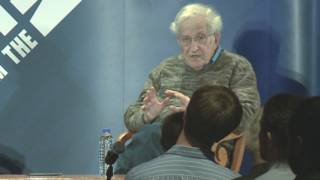
Guests
- Noam Chomskyworld-renowned political dissident, linguist, author and institute professor emeritus at Massachusetts Institute of Technology, where he’s taught for more than half a century.
During an event Tuesday at the Brooklyn Public Library, Noam Chomsky, the world-renowned political dissident, linguist, author and professor, was asked about Bernie Sanders’ run for the White House. “[H]e’s considered radical and extremist, which is a pretty interesting characterization, because he’s basically a mainstream New Deal Democrat,” Chomsky said. “His positions would not have surprised President Eisenhower, who said, in fact, that anyone who does not accept New Deal programs doesn’t belong in the American political system. That’s now considered very radical.” Chomsky concluded by noting that Sanders “has mobilized a large number of young people, these young people who are saying, 'Look, we’re not going to consent anymore.' And if that turns into a continuing, organized, mobilized force, that could change the country—maybe not for this election, but in the longer term.”
Transcript
AMY GOODMAN: We’re on the road in our 100-city tour, broadcasting from Northern Arizona University in Flagstaff. Nermeen Shaikh is in New York.
NERMEEN SHAIKH: Good morning, Amy. We begin today’s show with Noam Chomsky, the world-renowned political dissident, linguist, author and institute professor emeritus at the Massachusetts Institute of Technology, where he’s taught for more than half a century. Noam Chomsky has penned more than a hundred books.
AMY GOODMAN: Earlier this week, Noam Chomsky spoke at the New York Public Library along with former Greek Finance Minister Yanis Varoufakis, who will join us in a minute in our studio. During the event, Noam Chomsky was asked about Bernie Sanders’ run for the White House.
NOAM CHOMSKY: Well, Bernie Sanders is an extremely interesting phenomenon. He’s a decent, honest person. That’s pretty unusual in the political system. Maybe there are two of them in the world, you know. But he’s considered radical and extremist, which is a pretty interesting characterization, because he’s basically a mainstream New Deal Democrat. His positions would not have surprised President Eisenhower, who said, in fact, that anyone who does not accept New Deal programs doesn’t belong in the American political system. That’s now considered very radical.
The other interesting aspect of Sanders’s positions is that they’re quite strongly supported by the general public, and have been for a long time. That’s true on taxes. It’s true on healthcare. So, take, say, healthcare. His proposal for a national healthcare system, meaning the kind of system that just about every other developed country has, at half the per capita cost of the United States and comparable or better outcomes, that’s considered very radical. But it’s been the position of the majority of the American population for a long time. So, you go back, say, to the Reagan—right now, for example, latest polls, about 60 percent of the population favor it. When Obama put through the Affordable Care Act, there was, you recall, a public option. But that was dropped. It was dropped even though it was supported by about almost two-thirds of the population. You go back earlier, say, to the Reagan years, about 70 percent of the population thought that national healthcare should be in the Constitution, because it’s such an obvious right. And, in fact, about 40 percent of the population thought it was in the Constitution, again, because it’s such an obvious right. The same is true on tax policy and others.
So we have this phenomenon where someone is taking positions that would have been considered pretty mainstream during the Eisenhower years, that are supported by a large part, often a considerable majority, of the population, but he’s dismissed as radical and extremist. That’s an indication of how the spectrum has shifted to the right during the neoliberal period, so far to the right that the contemporary Democrats are pretty much what used to be called moderate Republicans. And the Republicans are just off the spectrum. They’re not a legitimate parliamentary party anymore. And Sanders has—the significant part of—he has pressed the mainstream Democrats a little bit towards the progressive side. You see that in Clinton’s statements. But he has mobilized a large number of young people, these young people who are saying, “Look, we’re not going to consent anymore.” And if that turns into a continuing, organized, mobilized—mobilized force, that could change the country—maybe not for this election, but in the longer term.
NERMEEN SHAIKH: That was Noam Chomsky, the world-renowned political dissident, linguist, author and professor emeritus at the Massachusetts Institute of Technology, where he’s taught for more than half a century. He spoke earlier this week at the New York Public Library as part of the ”LIVE from the NYPL” series, along with former Greek Finance Minister Yanis Varoufakis, who is here in the United States promoting his new book titled And the Weak Suffer What They Must?: Europe’s Crisis and America’s Economic Future. Varoufakis served as the Syriza party’s first finance minister after the left-wing party took power in 2015, after promoting an anti-austerity platform.













Media Options